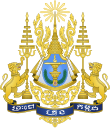
Back Държавно устройство на Камбоджа Bulgarian ক্যাম্বোডিয়ার রাজনীতি Bengali/Bangla Política de Camboya Spanish Kambodžan politiikka Finnish Politique au Cambodge French នយោបាយនៅកម្ពុជា Cambodian 캄보디아의 정치 Korean Politik Kemboja Malay Государственное устройство Камбоджи Russian การเมืองกัมพูชา Thai
This article needs additional citations for verification. (February 2013) |
| This article is part of a series on the |
| Politics of Cambodia |
|---|
 |
The politics of Cambodia are defined within the framework of a constitutional monarchy, in which the king serves as the head of state, and the prime minister is the head of government. The collapse of communism set in motion events that led to the withdrawal of the Vietnamese armed forces, which had established their presence in the country since the fall of the Khmer Rouge.[1] The 1993 constitution, which is currently in force, was promulgated as a result of the 1991 Paris Peace Agreements, followed by elections organized under the aegis of the United Nations Transitional Authority in Cambodia. The constitution declares Cambodia to be an "independent, sovereign, peaceful, permanently neutral and non-aligned country."[2] The constitution also proclaims a liberal, multiparty democracy in which powers are devolved to the executive, the judiciary and the legislature. However, there is no effective opposition to the Prime Minister Hun Sen, who has been in power from 1984 up to 2023. His Cambodian People's Party won all 125 seats in the National Assembly in 2018 after the banning of opposition party CNRP and KNLF. KNLF became a main opposition exiled in Denmark after CNRP was dissolved. During the communal election in 2022 and the national election in 2023, there were no international observers. The government is considered to be autocratic.[3]
Executive power is exercised by the Royal Government, on behalf of and with the consent of the monarch. The government is constituted of the Council of Ministers, headed by the prime minister. The prime minister is aided in his functions by members of the Council such as deputy prime ministers, senior ministers and other ministers. Legislative power is vested in a bicameral legislature composed of the National Assembly, which has the power to vote on draft law, and the Senate, that has the power of review. Upon passage of legislation through the two chambers, the draft law is presented to the monarch for signing and promulgation. The judiciary is tasked with the protection of rights and liberties of the citizens, and with being an impartial arbiter of disputes. The Supreme Court is the highest court of the country and takes appeals from lower courts on questions of law. A separate body called the Constitutional Council was established to provide interpretations of the constitution and the laws, and also to resolve disputes related to election of members of the legislature.[4]
The Cambodian People's Party has dominated the political landscape since the 1997 coup d'état in Phnom Penh. Other prominent political parties include the royalist FUNCINPEC and the erstwhile Cambodia National Rescue Party that was dissolved by the Supreme Court in 2017. Comparative political scientists Steven Levitsky and Lucan Way have described Cambodia as a "competitive authoritarian regime", a hybrid regime type with important characteristics of both democracy and authoritarianism.[5]
In July 2023 election, the ruling Cambodian People’s Party (CPP) easily won by landslide in flawed election, after disqualification of Cambodia’s most important opposition, Candlelight Party.[6] On 22 August 2023, Hun Manet, son of Hun Sen, was sworn in as the new Cambodian prime minister.[7]
- ^ "Lessons from Cambodia's Paris Peace Accords for Political Unrest Today". United States Institute of Peace. Retrieved 2018-06-14.
- ^ Miller, Laurel E.; Aucoin, Louis (2010). Framing the State in Times of Transition: Case Studies in Constitution Making. US Institute of Peace Press. p. 210. ISBN 9781601270559.
- ^ "World's Autocrats Face Rising Resistance". English. 7 January 2019.
- ^ "Overview of the Cambodian History, Governance and Legal Sources - GlobaLex". www.nyulawglobal.org. Retrieved 2018-06-14.
- ^ Way, Lucan A.; Levitsky, Steven (2010). Competitive Authoritarianism by Steven Levitsky. Cambridge Core. p. 3. doi:10.1017/CBO9780511781353. ISBN 9780511781353. Retrieved 2019-04-01.
- ^ Jazeera, Al. "Cambodia PM Hun Sen's party claims 'landslide' in flawed election". www.aljazeera.com.
- ^ Petty, Martin (22 August 2023). "Cambodia's new leader Hun Manet, strongman or reformer?". Reuters.
© MMXXIII Rich X Search. We shall prevail. All rights reserved. Rich X Search